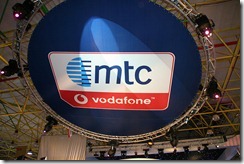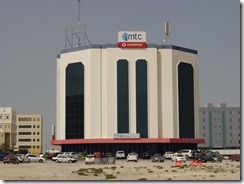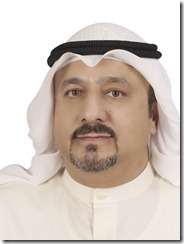In September, Zain Group announced it had entered into a Partner Market agreement with Vodafone; nearly six years after MTC (Zain’s former name) ended its co-branding arrangement with the UK operator in Kuwait and Bahrain. Much has changed in the cellco space in the Gulf since 2006, and the latest deal between Zain and Vodafone begs the question: Have the changes been fundamental or cosmetic?
The MTC Vodafone co-branding deal extended to Kuwait and Bahrain, and at the time increased the visibility of the Gulf operator significantly
Former Zain Group CEO Saad Al Barrak has been credited with the vision to turn a single country Gulf operator into a conglomerate operator with global aspirations. He presided over a time (2002 – 2010) in the telecom sector in the Gulf when self-confidence and belief were at their peak, and details such as huge licence costs were less of a concern to expansion plans that engulfed the world. Liquidity abounded, the effects of deregulation started to have an impact domestically for many Gulf operators, and the allure of international expansion and the driving of synergies appeared irresistible.
The level of regional self-confidence was epitomised in 2005 by Al Barrak’s comments surrounding why MTC (which was to become Zain) was choosing not to renew its co-branding agreement with Vodafone.
“As far as we are concerned, it’s done,” Al Barrack said, referring to the co-branding agreement between MTC and Vodafone. “We have learnt what we need to (from Vodafone) and now are ready to shape our own destiny.”
Al Barrak went on to comment that as a small operator in 2002 when MTC entered its first co-branding and marketing deal with Vodafone, the Gulf cellco had to “kiss the feet of Vodafone. It was the only way to tango with a giant,” Al Barrak commented.
Having successfully entered Bahrain together, MTC’s subsequent expansion plans did not include the mention of Vodafone’s cooperation, and the implementation of MTC’s 3x3x3 expansion strategy and drive into huge geographies such as Africa and Saudi Arabia without the Vodafone name, effectively ended this chapter of cooperation between the two companies.
As Gulf-based operators began to express their global and international aspirations more assertively from 2005 and beyond, Al Barrak’s challenge to “either become like them (the global operators – Vodafone, Orange and T-Mobile) or we buy them,” became a rallying call that saw outward investment by Gulf operators at a phenomenal pace.
The global financial crisis that began to take effect in late 2008 began to have an impact on Gulf operators’ expansionary vision, and by 2010, Zain had negotiated the sale of its assets in Africa to Bharti Airtel, for a healthy premium to what it paid five years previously.
What came thereafter was a recalibration of what Zain Group represented on the regional landscape, and with the subsequent departure of Al Barrak at the start of 2010, the operator was left to re-establish its corporate identity and direction. The evolution of Zain Group to become an acquisition target for the likes of Etisalat Group following the sale of the business in Africa meant that the company’s focus changed drastically after 2010, and to all intents and purposes, its continued operation as a standalone entity has brought with it a new sense of the Zain Group proposition.
Gulf and Middle East operators in general are feeling the pinch of the current global economic climate as well as challenging conditions in the markets in which they operate. Zain Group reported that for the first nine months of 2012 it generated consolidated revenues of KD974.6 million (US$3.5 billion), down 1.4 per cent year-on-year.
Net income for the nine months to September 30, 2012 amounted to KD201.6 million, down 3.8 per cent on the same period in 2011. The company’s consolidated EBITDA came in at KD437.3 million, a drop of 1.6 per cent year-on-year, reflecting an EBITDA margin of 44.87 per cent, down from 45 per cent the previous year.
Subscriber numbers also shrunk over the period, numbering 41.282 million at the end of September 2012, down from 41.36 million.
Zain Group net income for the nine months to September 30, 2012 amounted to KD201.6 million, down 3.8 per cent on the same period in 2011
It is these challenging dynamics that possibly contributed to Zain Group’s decision to again tie-up with a leading operator such as Vodafone. Their latest partnership agreement entails Vodafone working with Zain operating companies in Saudi Arabia, Bahrain, Kuwait, Jordan and Iraq to provide customers with high quality communications services. The companies say the move will enhance both Zain and Vodafone’s ability to meet growing demand among multinational businesses for sophisticated voice and data communications solutions as well as advanced roaming services within the Middle East. This will in turn complement Vodafone’s own regional operations in Egypt and Qatar and increase the number of countries in which Vodafone has Partner Market agreements to more than 50.
Zain will have access to Vodafone’s devices and services in its home markets and become the preferred partner of Vodafone in respect of the agreed areas of cooperation. Zain and Vodafone will work together to provide customers with enhanced network coverage, harmonised roaming rates across multiple countries with greater cost efficiencies and Zain will be able to use the Vodafone brand.
Vodafone’s multinational customers served by Vodafone Global Enterprise will benefit by being able to add Zain countries to their existing contracts for international managed services, while continuing to be serviced via a single point of contact. Zain will similarly benefit from Vodafone’s footprint. In addition, Vodafone plans to support multinational corporations by providing communications, expenditure tracking, and procurement services while introducing innovative mobile price plans across the two organisations’ shared area of operations.
And while market commentators wait to see the actual impact of the Vodafone agreement on Zain’s positioning, many do believe that going ahead with the deal marks the end of one era for Zain, and reserved judgement as to the success of the next era.
“The Zain vision seems to be under review, and the deal with Vodafone might somehow be the beginning of the end of a certain ‘era’ where people (in the Gulf) thought that local operators would grow and conquer massively,” a senior telecom source with extensive Middle East telecom experience told Comm. “That being said, telecom is a size game where operational efficiency is key, and it has always been clear that the Middle East operators would either have to get closer together or get closer to others if they wanted to achieve size and efficiency. Zain has understood that it would compete better with the help of a major player, and this partnership seems to be an excellent way to test a new approach.”
In recent years, M&A activity in the Middle East has by-and-large been restricted to consolidation of existing stakes, so many operators are facing similar internal reviews and discussions as to how best to navigate the altered landscape. Zain appears to have the right notion that diversifying revenue streams is one approach to maintaining top-line revenues, and what now needs to be seen is how effectively such activities can be identified and effected.
In October, for example, Zain revealed that it is currently working on establishing a regional data network, which will be directed by a new wholly-owned subsidiary company, Zain Group Wholesale.
Speaking at a conference in Dubai, Zain Group Deputy CEO and COO, Hisham Akbar outlined the thinking behind the formation of Zain Group’s operation, which is set to offer wholesale voice and data services, leveraging Zain’s facilities based license in addition to its Internet Service Provider (ISP) credentials and access to spectrum.
Akbar spoke of how Zain has decided to exploit its wireless technology leadership, coverage and licensed countries of operation to their maximum potential and that Zain Group Wholesale will enjoy a quick start given the presence of already significant organic traffic from existing Zain customers.
Speaking at the conference, Akbar said: “Zain Group Wholesale allows us to leverage our existing competencies and assets while at the same time giving our customer base access to additional voice and data services.”
Akbar believes that Zain Group Wholesale will enjoy a quick start given the presence of already significant organic traffic from existing Zain customers
“From being a user of third-party fibre, Zain is moving to acquire and participate in fibre facilities construction, which will further bolster the services and products that can be offered by Zain Group Wholesale. Zain Group has also started concluding arrangements by which it will be able to deliver over-the-top (OTT)-type services to consumers on their mobile devices,” Akbar said.
As broadband traffic continues to grow at exponential rates across the region Zain Group believes its wholesale strategy will help cater to this market trend, complementing and enhancing the operator’s existing strategy.





0 comments ↓
There are no comments yet...Kick things off by filling out the form below.
Leave a Comment